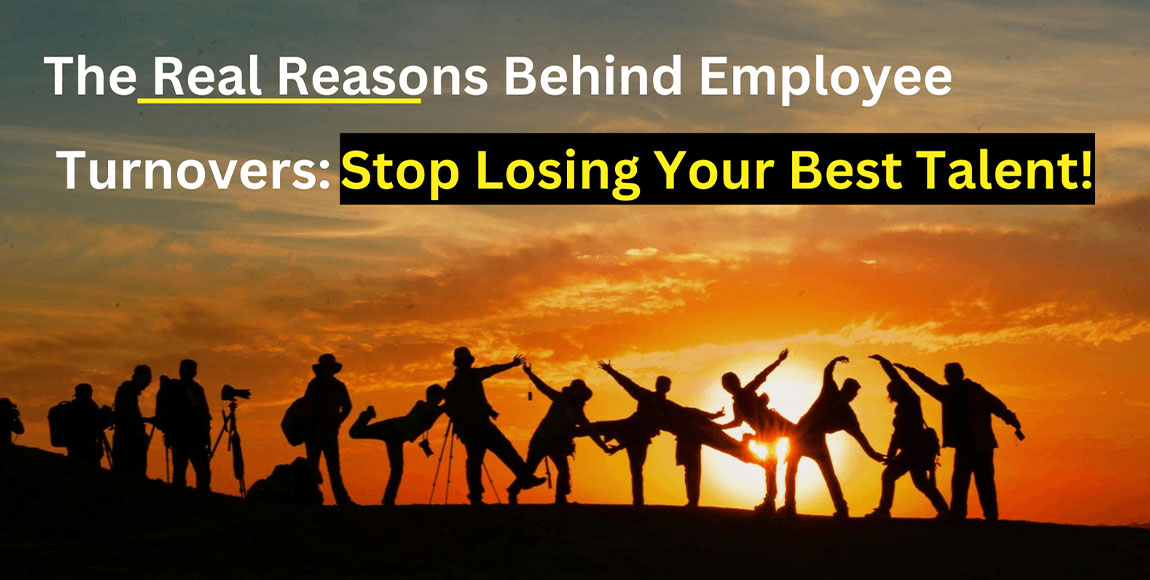
The Real Reasons Behind Employee Turnovers: Stop Losing Your Best Talent!
So, you’ve noticed a colleague seeming distracted, disengaged, and less efficient lately?
Or perhaps you’ve seen someone call it quits unexpectedly, without any tell-tale signs beforehand?
Let’s dive into the real reasons behind these departures – reasons they often don’t or dare not tell you.
Understanding the Root Causes
In today’s fast-paced work environment, retaining top talent has become crucial to stay ahead of the competition. However, employee departures are often rooted in deeper issues than you might think, such as:
a. Limited career advancement opportunities and feeling underpaid.
When career progression opportunities are scarce or nonexistent, and salary packages are perceived as unequal to their qualifications, skills, and accumulated experiences, employees may start feeling stifled, demotivated, and unfulfilled in their roles. Without clear paths for salary progression and opportunities to enhance their skills and take on more responsibilities, employees may become disengaged and ultimately seek opportunities elsewhere.
b. Faced disrespect or discrimination at work.
This is a surefire way to lose your employees aka your biggest asset. Instances of disrespect and discrimination can be based on factors such as race, gender, age, or even organizational hierarchy. Whether these instances are subtle or overt, they erode trust, confidence, and camaraderie in the organization at large as well as its leadership. Cases of disrespect and discrimination at work can create a hostile and suffocating environment.
As a result, employees may feel distressed, disconnected, and marginalized — conditions that can have detrimental effects on their mental health. Consequently, they may contemplate leaving the organization in pursuit of a more inclusive, respectful, and peaceful workplace environment.
c. Feeling undervalued or unrecognized.
The need to feel needed, valued, and appreciated is universal among all mankind. When their efforts go unnoticed or when they are not given the chance to shine at work, they may feel unvalued and overlooked. This can lead to feelings of resentment and disengagement, as employees begin to question their worth and significance within the organization.
Without meaningful recognition and appreciation, their morale and productivity suffer, compelling them to seek validation and affirmation elsewhere to fulfill this fundamental human need.
d. Corporate values no longer align with employee’s personal values and beliefs.
When corporate values diverge from employees’ personal values and beliefs, it can create a significant “discord” that undermines their sense of alignment and belonging within the organization. For example, if an organization prioritizes profit over employee well-being or fails to uphold principles of diversity and inclusion, employees may feel conflicted and discontent, as employees struggle to align or reconcile their personal values with the values adopted by the organization.
When corporate values no longer resonate with employees’ personal beliefs, they may seek employment elsewhere, where their values and beliefs are better aligned with the organizational culture and ethos. It is also interesting to note that a belief in the importance of “hybrid work arrangements” or “work-life balance” are no longer merely buzzwords lately, but rather a value espoused by many in today’s working world.

Actionable Solutions to Prevent Turnover
To stem the tide of turnover, these proactive measures are essential:
a. Provide career growth opportunities.
Invest in leadership development, mentorship programs, and personal training to empower employees and fulfill their common need for growth. Although it may require you to fork out extra money, it always pays off in the long run.
b. Review and adjust salary packages.
Regularly do thorough assessment of salary offerings to ensure they remain relevant, competitive, and attractive, reflecting the current market trends and needs of job seekers today.
c. Cultivate open communication and a safe space.
Create a culture of transparency and trust, encouraging employees to voice their concerns and ideas without fear of being judged or refuted. Adopt a “quick to listen, slow to speak” approach.
d. Solicit and act on feedback.
Effective communication is a two-way street that leads to a harmonious workplace. Hence, aside from encouraging employees to speak up, regularly seek feedback from them as well to identify areas for improvement and take prompt action to address their needs and concerns.
e. Recognize and reward performance.
Acknowledge and appreciate employees’ contributions through rewards, recognition programs, and opportunities for career advancement.

Conclusion
In conclusion, employee turnover is a multifaceted issue with far-reaching implications for organisations. By addressing the underlying causes and implementing proactive retention strategies as mentioned above, companies can build a resilient workforce poised for long-term success.
From building competence to fostering a sense of unity and belonging within your company, our team of skilled professionals and trainers got you. Trust us to cultivate a workplace culture that inspires your employees to bring their A game every day! Contact us now!